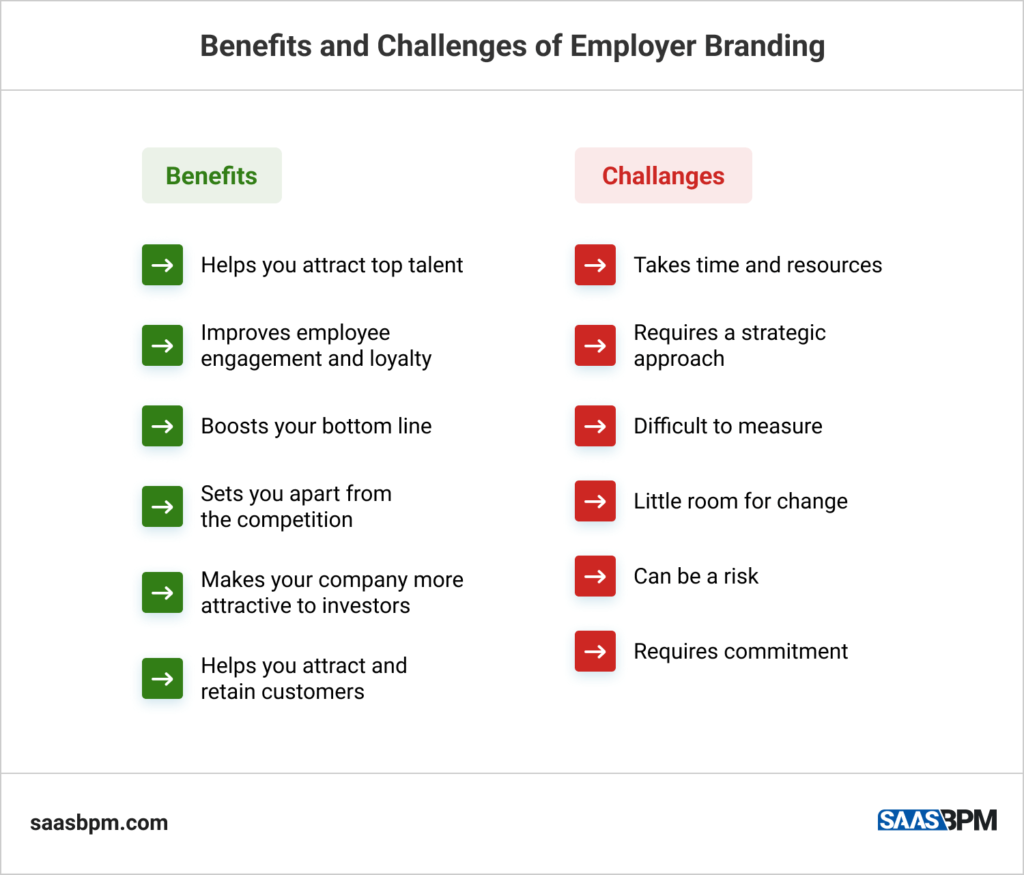Employer branding is a hot topic in today’s job market. Aspiring professionals are researching companies and their cultures long before they ever apply. So, it’s important for businesses to have an effective employer branding strategy in place.
In this article, we will explain what employer branding is, its benefits and challenges as well as some best practices to build your employer brand effectively. Then, we will outline some statistics and ways to implement them in your business strategy.
What Is Employer Branding?
Employer branding is the process of creating a successful profile that will attract and retain top talent to your company. This includes developing a positive reputation as an employer, creating employee value propositions, and communicating your employer brand through various channels.
Why Is Employer Branding Important?

There are a number of reasons why employer branding is important. First, it can help you find better talent. Candidates usually do thorough research on potential employers before applying, and a strong employer brand will make your company more attractive to them.
Second, employer branding can help you improve employee retention. Employees who feel strongly connected to their employer and associate with a publicly acknowledged brand are more likely to stay with the company.
Third, employer branding can help you optimize your recruitment process. A strong employer brand will help you attract higher-quality candidates, which means you’ll spend less time and money on HR.
5 Employer Branding Stats Business Leaders Should Know
Here are some employer branding stats that all business leaders should know and act on:
– 86% of job seekers say that employer brand is a major factor in their decision to apply for a job. (Source)
– 63% of employees would leave their current job for one with a better employer brand. (Source)
– 72% of employers say that employer brand has a major impact on their ability to attract and retain top talent. (Source)
– 56% of businesses assess the success of their employment brand. (Source)
– 92% of people are considering changing their job to a company with a great brand reputation (Source).
How To Reflect On Employer Branding Stats

So, the main takeaways from the latest employer branding trends are that businesses realize the importance of investing in building a better brand to acquire better candidates in their teams. However, not many employers monitor these campaigns and reassess the results.
Also, job seekers seem to put a lot of emphasis on a company’s employer brand and public image and make sure they research it well before applying.
There are a few things you can do to reflect on these current employer branding trends and appropriate them in your organization:
– Look at your recruiting costs: Are you spending more on recruiting than you did in the past? If so, it could be a sign that your employer brand needs some work.
– Investigate your employee satisfaction rates: Are your employees happy with their jobs? If not, it could be a sign that your employer brand needs some work.
– Assess your employee retention rates: Are you losing more employees than you’d like? Think about steps you can implement in order to keep them in your company.
– Include your employees: Ask your employees what they think of your company. Get to know their preferences. What do they like and what aspects could be improved?
– Talk to your customers: Ask your customers what they think of your company. Do they see you as a leader in your industry? Do they feel good about doing business with you? What could be improved?
What Are the Benefits of Successful Employer Branding?

There are numerous benefits of employer branding:
– Helps you attract top talent: A strong employer brand can help you attract the best and brightest employees to your company.
– Boosts employee engagement and loyalty: Happy employees are loyal to their employer brand and its core values. As a result, you can increase productivity and lower turnover rates.
– Improves your bottom line: A well-crafted employer brand can improve your company’s bottom line by reducing recruiting and training costs, and increasing employee productivity.
– Sets you apart from the competition: A robust employer brand can help you differentiate your company from the competition and lure the best candidates to your team.
– Makes your company more attractive to investors: If you build an effective employer brand, your company will be more attractive to potential investors. This is especially important for startup businesses that heavily depend on financial help like venture capital and need to demonstrate high growth potential.
– Helps you attract and retain customers: A solid employer branding strategy can help you attract and retain customers. Clients are more prone to partnering up with businesses that are known to have good employment practices as this guarantees high-quality work and experts.
What Are the Challenges of Employer Branding?
Despite the many benefits of employer branding, there are also some challenges to consider:
– Takes time and resources: Creating and maintaining a strong employer brand requires time and resources.
– Requires a strategic approach: Employer branding is not something you can do on the fly. It requires careful planning and execution.
– Difficult to measure: Measuring the success of your recruitment efforts can be difficult. There are many factors to take into account, such as employee satisfaction, engagement, and retention rates.
– Little room for change: Once your employer brand is established, it can be difficult to change. This is why it’s important to get it right the first time to avoid the need to redesign and completely change your brand concepts.
– Can be a risk: Employer branding can be a risk because it’s based on perception. If your employer branding efforts are not well-received, it could damage your company’s reputation permanently.
– Requires commitment: Creating a powerful employer brand is not a one-time effort. It requires ongoing commitment from senior leadership and all employees.
How To Build Your Employer Brand Successfully?

If you want to improve your employer branding strategy, there are a few things you can do:
– Define your employer brand: What makes your company unique? What are your core values? What would be your ideal candidate for the job? Answering these questions will help you define your employer brand.
– Communicate your employer brand: Once you’ve defined your employer brand, you need to communicate it to the world. This can be done through your website, social media, job postings, and other marketing materials.
– Live your employer brand: It’s not enough to just communicate your employer brand – you need to live it as well. Make sure your employees are proud to work for your company and that they’re living the brand every day.
– Measure your results: Finally, don’t forget to measure the success I’ll employer branding efforts. This will help you fine-tune your strategy and ensure that you’re getting the most bang for your buck.
Bottom Line
In order to attract top talent, you need to have a strong employer branding strategy. This can be built in many ways, but it requires effort and forethought. These 5 statistics on employer branding should help you analyze your own company’s efforts and compare them to other successful businesses.
Undoubtedly, building a strong employer brand reputation has many benefits, but it also comes with its challenges. By being aware of both, you can put your company in a better position to succeed in today’s competitive market.

